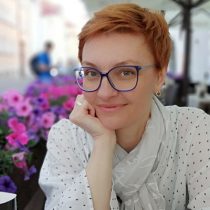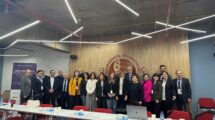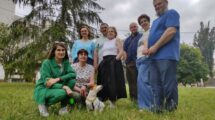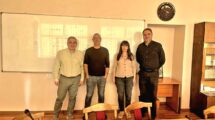Volodymyr Galagan is one of the founders of the Ukrainian Research and Academic Network, URAN. He led the organisation for more than two decades and in recent years he brought it into closer contact with the wider NREN community via GÉANT Association and the EU-funded Eastern Partnership Connect project, EaPConnect. As the first EaPConnect project approaches its end, Volodymyr reflects on his ‘journey’ with URAN.
Q: Volodymyr, what motivated you to start the NREN?
It all started with local networks; I was interested in them even when they did not exist. I was working at the Research Institute of System Technology at the Kyiv Polytechnic Institute. My group was involved in data collection networks. We made our first local network within one room using our own technology. Then we created a local network on the campus. When serial network cards for computers appeared, we built the first local network in the Ministry of Education. This included five computers. It was a breakthrough because no one was close to such networks. People didn’t even know they existed.
Then everything went much faster. My colleagues and I began to share experiences with European colleagues, travel to scientific conferences, gaining access to cutting-edge information. The idea of NRENs arose and we were happy with the idea as we considered it promising. I completely focused on creating our NREN and, in 1997, URAN was born. Yuriy Yakymenko headed the Board and took over all administrative issues, and I was responsible for the technical side.
Q: How do you feel about the fact that URAN has been helping people in Ukraine all this time to do their work in research and education?
It’s a part of my life, and quite a significant one. All my efforts went to it. Some colleagues even told me: “Volodymyr, you spend too much energy on URAN, you care too much about it.” There is a sense of satisfaction that my business is needed.
Q: It must be good to know that the NREN provides vital value to society in times like the COVID-19 pandemic?
Of course. We provide services, moreover, interest in these services is growing during the pandemic. It inspires us to new accomplishments, to new efforts. We are constantly expanding our portfolio of services that would improve educational and research processes.
Q: This crisis has highlighted the value of international collaboration among NRENs. URAN’s participation in the GÉANT Association and EaPConnect has provided a framework for professional collaboration, but also for personal contacts. How important has this been for you?
Personal connections, in general, are the basis of human life. The EaPConnect project has given a lot in terms of establishing, maintaining and developing such connections. The project taught me to work in cooperation with other NRENs because we did a lot of joint work. Complex challenges, even of a technical and analytical nature, are solved simply when you ask the community.
With colleagues from the Eastern Partnership countries, we actively communicate and learn about work, challenges and successes. Analysing and taking into account other people’s experiences, you can choose your actions to achieve results. Exchanging and communicating with NRENs from other European countries is very useful. I know that many of our colleagues have borrowed from our experience as well.
Q: What has URAN achieved in the EaPConnect context that you are proud of?
We upgraded the technical condition of the entire URAN network. The biggest achievement is the increase in capacity of our data centre, which was previously at a basic level. We can be proud: we achieved this despite various difficulties. We also increased the reliability of our main node and data centre by installing a diesel generator with an automatic start, which now provides guaranteed power in all conditions.
Our team has grown up, we know how to act in the market, how to work with users. Marketing communications – one of the areas that appeared and developed thanks to EaPConnect – was absent in URAN before. The experience we gained during the project will help us to perform similar tasks for the development of services much more efficiently and quickly. Moreover, during the project, we understood what our place is in Ukraine in general, in our society. This is important because we have a task to ensure full entry of Ukraine into the digital space of Europe.
Q: URAN has been ‘your baby’ for many years, but last year your experience and expertise were redirected to a new role within URAN. What have been the greatest challenge and opportunity in that new role?
I was very pleased with what happened. I continued working for the project and URAN but relieved myself mentally of some of the responsibility. The new director and I agreed that I would help him as much as I could. There was a division of the burden that used to fall on me alone. Thus, efficiency has increased significantly. I have more opportunities to modernise our network, because my interest is the structural and technical system of URAN. I was directly involved in technical modernisation and felt that we had success here.
Q: What do you think readers would be surprised to know about you?
In my young years, my hobby was travel. I went to the Caucasus, climbed mountains, conquered the peaks. One of them, Mahar, 4200 metres, was near the University’s camp ‘Globe’. My friend and I decided to reach the mountain in one day, we ran there, ran back. Those routes were quite difficult and it inspired me. Later, my wife and I hiked through the entire mountainous and green Crimea. That’s maybe what no one knows about me – I was into rock climbing.







